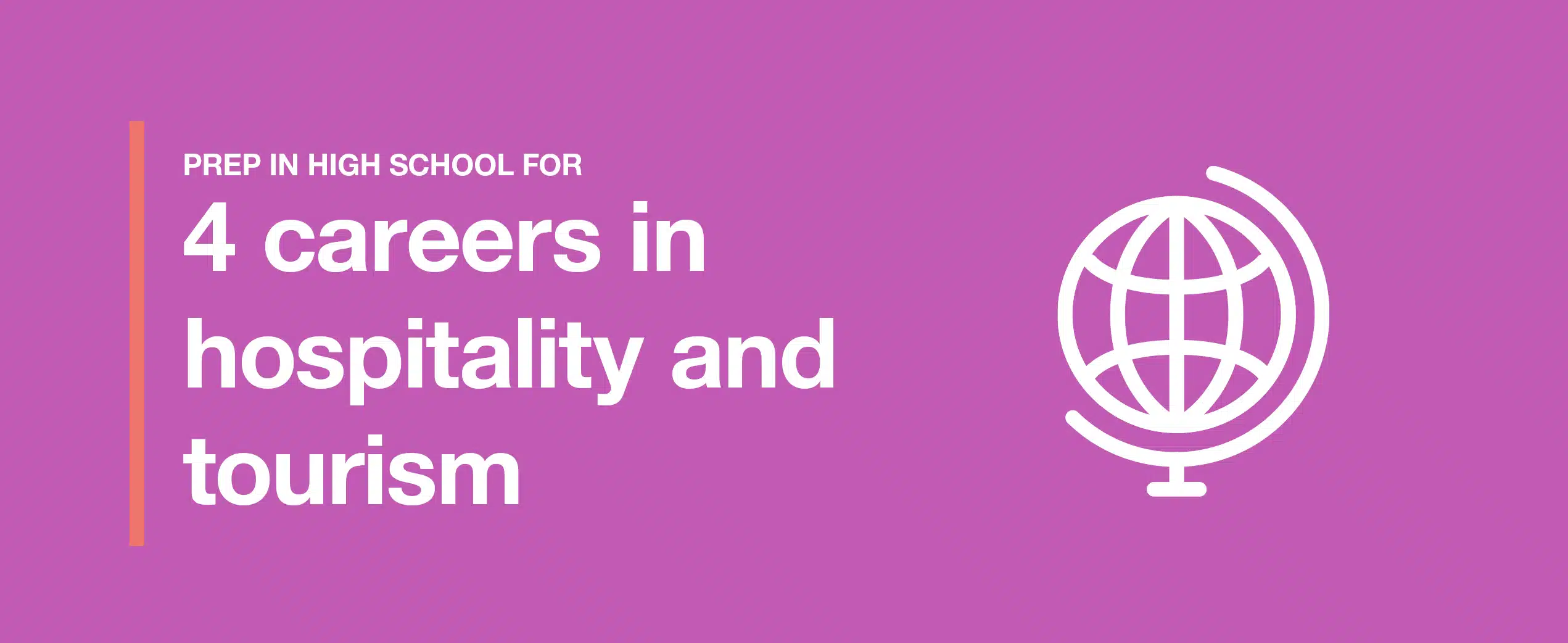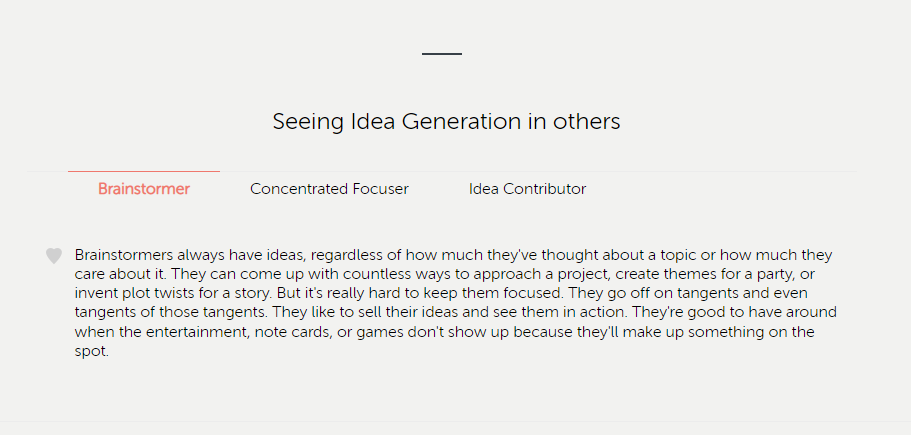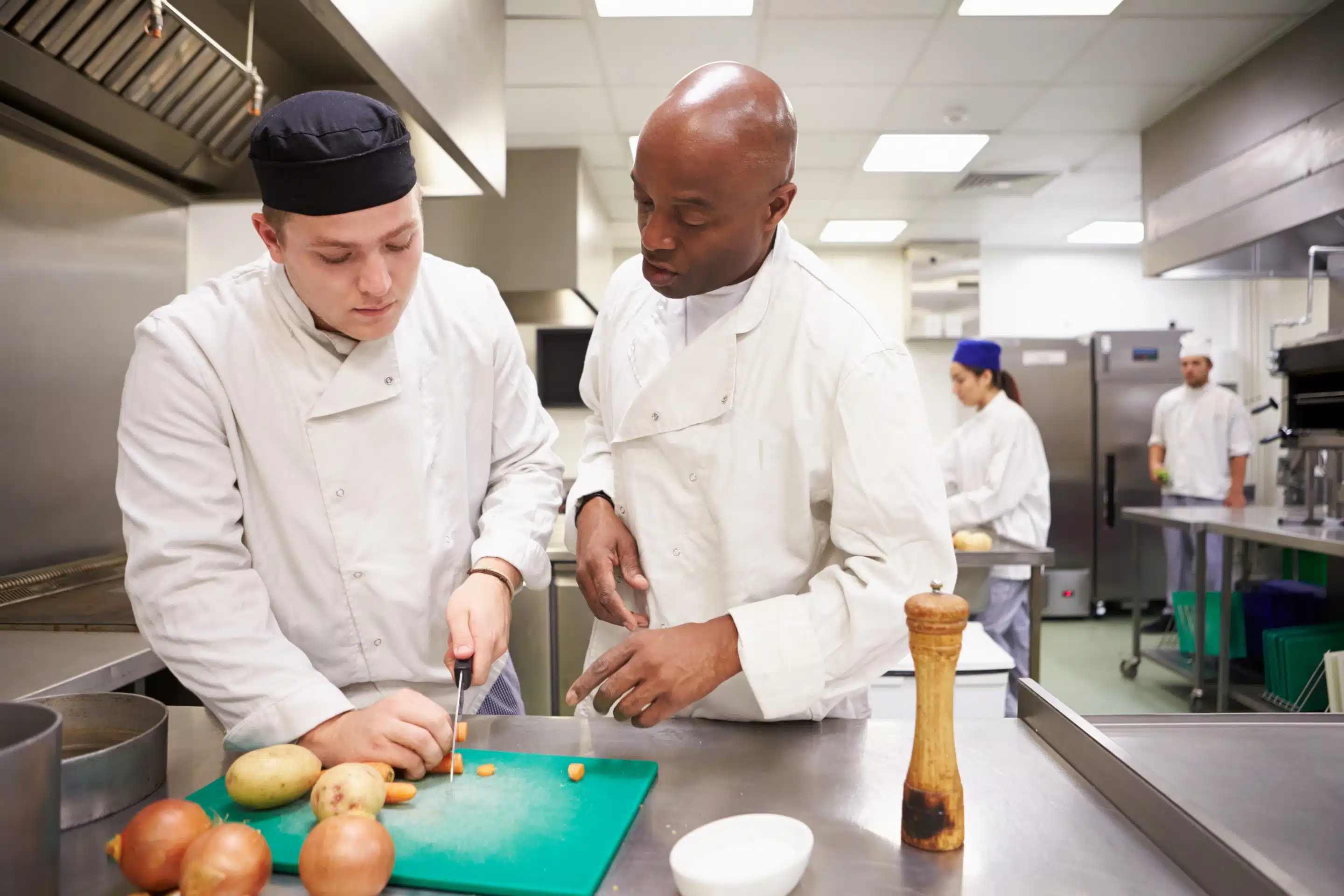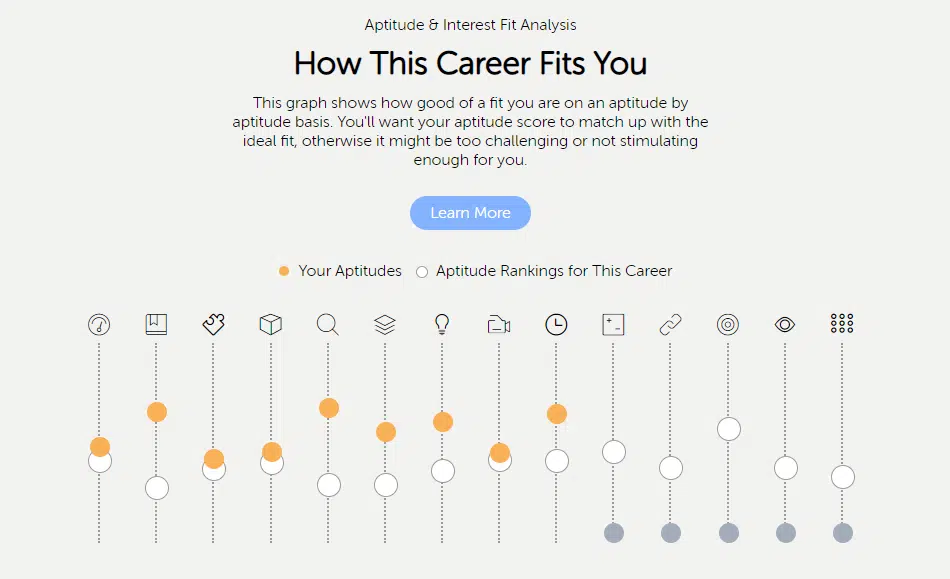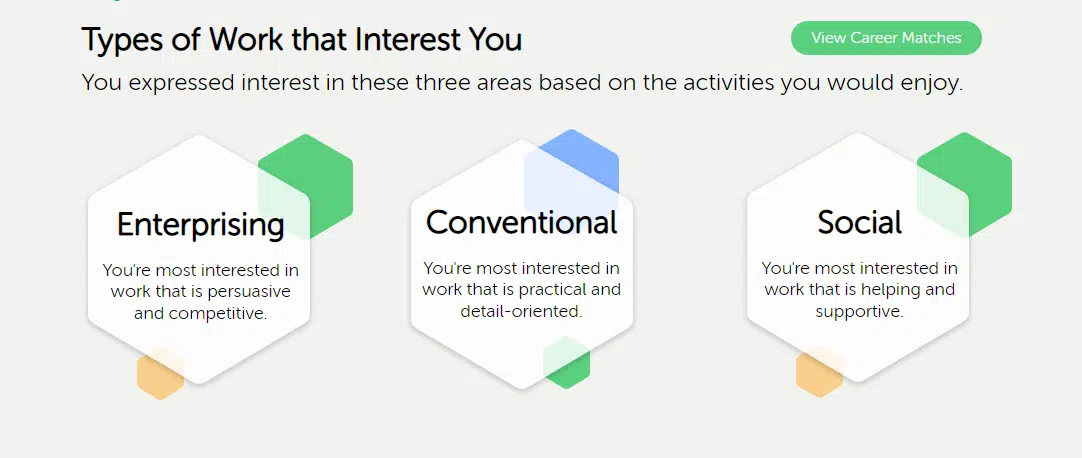The hospitality and tourism industry is the fifth-largest in the US. And roughly 15 million Americans hold hospitality and tourism jobs. Roles span event planning, travel and tourism, lodging, food and beverage, and sports and recreation.
The Bureau of Labor Statistics “forecasts growth for careers in the industry throughout the decade.
For high school students who love people, a future career in hospitality and tourism is a perfect fit.
In this post, I dig into these 4 hospitality and tourism careers:
I also cover the job outlook, fit, and stackable credentials students can earn in high school to get a jumpstart on securing their future hospitality and tourism careers. Stackable credentials are different certifications earned in Career and Technical Education (CTE) classes that complement and build on each other.
CTE certifications give you, as a student, proof of the skills you learn in CTE courses. Proof you can use to get a job or skip entry-level college courses on your way to an associate’s or bachelor’s degree.
4 growing careers in hospitality and tourism that high school students can start prepping for
Career 1 – event planner
If gatherings are your style, a role as an event planner might be your best-fit career. If it sounds fun to manage all aspects of professional meetings and events, including location, transportation, activities, speaker programs, marketing, and budget, this role might be for you.
Event planners make sure things run smoothly when people come together for an event or meeting. Types of meetings can include conferences, conventions, even weddings, or concerts. Part of the job includes negotiating contracts, arranging catering and hotel services, and organizing conference space, speakers, and/or entertainment.
While event planners spend time in an office, they also travel to event sites. They need to be able to think on their feet, work under pressure, and keep organized records.
O*NET OnLine is a career exploration and job analysis tool sponsored by the US Department of Labor. It lists the top 5 work activities for event planners as:
- Organizing, planning, and prioritizing work
- Making decisions and solving problems
- Communicating with supervisors, peers, or subordinates
- Communicating with people outside the organization
- Working with computers
The job outlook for event planners
The need for event planners is forecast to be strong in the years ahead. O*NET OnLine labels the role as having a bright outlook. The Bureau of Labor Statistics data for meeting, convention, and event planners indicates that the:
- Median wage in 2020 was $51,560 per year
- Number of job openings in 2020 was 125,900
- Job outlook from 2020‒2030 forecasts 17.5% growth
Is being an event planner right for you?
The best way to see if you have what it takes to thrive as an event planner is to uncover your aptitudes. Aptitudes are the natural talent to learn or perform in given areas. They solidify by the age of 14.
You can uncover your aptitudes in YouScience Discovery. It’s an aptitude-based career guidance solution for high schools and individuals. When you do, you can access more than 500 careers and how they align to both your aptitudes and interests. Students who take Discovery often find they have aptitudes for careers they never considered and may have never heard of.
So, what natural talents make someone a fit for event planning? The top aptitudes that rank this role in Discovery are:
- Spatial visualization or the ability to translate two-dimensions into three to read maps, blueprints, and diagrams.
- Numerical reasoning, which is the ability to process math problems and recall numerical facts and data when problem solving.
- Idea generation with a leaning toward being a brainstormer to come up with ideas quickly.
- Timeframe orientation with a leaning toward being a future focuser, so you can plan things for the future.
- Vocabulary or the ability to communicate well verbally with other people.
When you take YouScience Discovery, you uncover your aptitudes. You also see how an aptitude works in different people. This image is the breakdown of how idea generation works for different people.
In addition to aptitudes, event planners are most likely to enjoy work that involves starting and carrying out projects, follows set procedures and routines, and involves working with, communicating with, and teaching people. In other words, if you have the right aptitudes, but are an introvert (which you can find out in Discovery), maybe check your career matches for more careers that maximize on your natural talents.
What do you need to get hired as an event planner?
According to the BLS data in YouScience Discovery, 45% of event plans have a high school diploma or GED and 40% have a bachelor’s degree. Many also earn The Convention Industry Council offers a Certified Meeting Professional (CMP) credential for meeting and convention planners – a post-secondary professional certification.
If you’re in high school and are interested in an event planning future, you can earn CTE credentials to use for an entry level job and/or to college courses.
Stackable credentials future event planners can earn in high school
- Event Planning and Management covers all the basics of planning and pulling off a large-scale event – from conferences, to sporting events, weddings, or workshops.
- Business Communications assesses your grasp of the basics of effective communication.
- Customer Service covers not just how to serve customers, but to help them make decisions and resolve concerns.
- Exploring Business and Marketing touches on all the basic facets of business and marketing – two key parts of event planning.
- Desktop Publishing I covers the basics of desktop publishing, so you can make event signage on your own.
Career 2 – head chef
A head chef is just what it sounds like – the chef in charge. These “culinary chiefs” work in restaurants, hotels, residential living centers, and elsewhere. They direct kitchen staff and prepare food. They may plan and price menu items, interact with clients, create recipes, order supplies, establish serving sizes, and keep records and accounts.
Head chefs also hire and supervise cooks and other food preparation workers. They’re responsible for food safety and sanitation, food storage methods and temperatures, and employee compliance with safety regulations.
O*NET OnLine lists these top 5 work activities for head chefs:
- Coaching and developing others
- Developing and building teams
- Organizing, planning, and prioritizing work
- Making decisions and solving problems
- Training and teaching others
What does the future look like for head chefs?
A career as a head chef has a healthy outlook. According to MyNextMove.com, “New job opportunities [for head chefs] are very likely in the future.” And the Bureau of Labor Statistics data for head chefs reports that the:
- Median wage in 2020 for a head chef was $53,380 annually
- Number of job openings in 2020 was 110,700
- Job outlook for head chefs from 2020‒2030 includes 25% growth
Do you have the chops to excel as a head chef?
You’re likely to excel as a head chef if your YouScience Discovery results find you have a strong talent for:
- Noticing details (visual comparison speed)
- Seeing how numbers relate to one another (numerical reasoning)
- Thinking visually (spatial visualization)
- Working as both a generalist and specialist (work approach)
When you take YouScience Discovery, you find matching careers along with detailed information for each one. The image above shows the author’s aptitude match for a role as chef/head cook. The orange dots are the author’s aptitude rank. The white dots are the aptitude ranking for the career.
Head chefs need to be able to calculate quantities for food and supply orders and serving sizes. They also need to coordinate employee schedules as well as cooking and serving times.
What if your aptitudes don’t match up? That’s okay, Discovery shows you hundreds of careers that do match your aptitudes. And knowing your aptitudes and the matching careers is golden for finding the shortest path to your best-fit future.
If you’ve got head-chef chops, what education do you need?
If you want to become a head chef, you want to finish high school. Earning an associate’s degree helps too. You may even want to pursue an apprenticeship.
You can take a shortcut too by earning CTE certificates in high school and/or at a community college.
Stackable credentials that prepare students to be the head chef
Precision Exams by YouScience offers industry-recognized certifications that can help your CTE teacher prep you for a role as a head chef along with other roles in the food and service industry.
- Culinary I is the beginning of the Culinary Arts pathway – your pathway to being a head chef. It covers the essentials of cooking and career prep.
- Culinary II takes the culinary pathway to the next step including using commercial food prep equipment and preparing large quantities of food.
- Culinary III adds to the skills learned in Culinary II to assess skills with catering, bakery, restaurant, hospitality, and quick service business operations.
- Leadership Principles I assesses what you’ve learned about being an effective leader, including goal setting, time management, effective communication, diversity, and decision making.
- Business Concepts covers the basics of business, including, including economics, entrepreneurship, finance, marketing, and creating documents.
Career 3 – lodging manager
Lodging managers are the heart of any hotel, motel, or other type of accommodation. They’re tasked with making sure guests have a good experience and that things run efficiently and profitably.
O*NET OnLine lists the top 5 work activities for lodging managers as:
- Communicating with supervisors, peers, or subordinates
- Making decisions and solving problems
- Getting information
- Identifying objects, actions, and events
- Training and teaching others
Job trends for lodging managers
The outlook for future lodging manager jobs isn’t quite as bright as the outlook for event planners and head chefs. The projected growth in new jobs from 2020 to 2030 is 8.7%. But Bureau of Labor Statistics data shows that the:
- Median wage for lodging managers in 2020 was $56,590
- Number of job openings in 2020 was 309,800
What natural abilities should lodging managers have?
Lodging managers need aptitudes that align well with solving problems and interacting with others, like:
- Sequential reasoning that leans toward a process supporter or someone who enjoys rules and logical routines.
- Leaning toward a timeframe orientation as a present focuser, which means you focus on near term goals, which will help you keep the hotel or lodge running smoothly on a day-to-day basis.
Additionally, Discovery shows you types of work that you’re likely to be interested in. For lodging managers that includes types of work that are:
- Enterprising — Work that includes starting and completing projects. You find it interesting to lead people and make many decisions.
- Conventional — Work that is consistent and that lets you develop policies and procedures for yourself and others. Work that creates safety for the company, its employees, and customers.
- Social — Work that involves helping and supporting others.
YouScience Discovery assesses interests as well as aptitudes and shows you the types of work that might interest you based on interests.
The education pathway for lodging managers
According to the BLS, the typical education needed for entry level lodging manager roles is a high school diploma. Other education paths can include a bachelor’s degree in hospitality or hotel management, an associate’s degree or a certificate in hotel management, or a high school diploma combined with CTE certificates.
Stackable certifications for lodging managers
High school students interested in a future in lodging management benefit from certifications from these exams.
- Lodging and Recreation tests your knowledge on lodging, front office operations, forecasting, occupancy levels, recreation, and recreation agencies.
- Hospitality and Tourism assesses your knowledge about the industry to ensure you have a strong foundation to build a future career on.
- Business Management tests knowledge about the four basic functions of management – planning, organizing, directing, and controlling.
- Customer Service covers not just how to serve customers, but how to help them make decisions and resolve concerns.
- Leadership Principles I assesses what you’ve learned about being an effective leader, including goal setting, time management, effective communication, diversity, and decision making.
Career 4 – travel agent
Travel agents work with groups and individuals on short-term and long-term travel plans. They ultimately sell the transportation, lodging, and activities needed for travel. They also work with clients to plan destinations, itineraries, and make arrangements.
The top 5 work activities for travel agents according to O*NET OnLine are:
- Process sales or other transactions
- Calculate costs of goods or services
- Gather customer or product information to determine customer needs
- Sell products or services
- Record operational details of travel
Job trends for travel agents
The outlook for travel agents is fair with projected growth in new jobs from 2020 to 2030 at 5%. Bureau of Labor Statistics data shows that the:
- Median wage for travel agents in 2020 was $42,350
- Number of job openings in 2020 was 60,500
What aptitudes set travel agents apart?
Typically, travel agents need to have inductive reasoning that leans toward an investigator style. That means they’re wired to enjoy and excel at processing knowledge and applying it. It means they also excel at helping others understand and apply information efficiently and at a pace that works for them.
They have a strong sequential reasoning aptitude, which means they can arrange information in a logical order, understand it, and explain how it fits together to someone else. Their sequential reasoning skills tend to be that of a collaborative planner.
And like other hospitality and tourism careers, travel agents enjoy social types of work that let them help and support others.
Education pathways for travel agents
Travel agents need a high school diploma. O*NET OnLine reports that 37% have an associate’s degree while only 14% have a bachelor’s.
A great way to get a travel agent job right out of high school or skip classes in community college is to earn certificates through your high school CTE program.
Stackable credentials for future travel agents
- Hospitality and Tourism assesses your knowledge about the industry as a whole to ensure you have a strong foundation to build a future career on.
- Customer Service covers not just how to serve customers, but to help them make decisions and resolve concerns.
- Advertising and Promotions covers basic marketing principles – a must when trying to sell a customer
- Business Office Specialist assesses the basic computer software skills needed in every business, including word processing, spreadsheets, databases, and electronic presentation software.
- Business Communication I covers the basics of personal and professional oral, written, interpersonal, technological, and employment communication.
Credentials for every hospitality and tourism career pathway
While credentials specific to a given career, especially stackable credentials, are valuable as you enter the workforce, other credentials are critical as well. Here are a few certificates to consider earning no matter what career pathway you’re on.
21st Century Skills
Soft skills, employability skills, 21st Century skills – whatever someone calls them, everyone needs them, including high school students. 92% of hiring managers value soft skills as much or more than hard skills.
And with the Precision Exams by You Science 21st Century Skills bundle, you can get tangible proof of your employability skills with a certificate. Your certificate shows employers that you have critical thinking, problem solving, creativity, leadership, teamwork, and collaboration skills, and more.
Computer skills
Virtually every job today involves technology. O*NET OnLine includes a Technology Skills section for every job included in this post. No matter the career you pursue, you’ll need to know how to use email and various software.
A good place to start is with a certificate that proves you have basic computer knowledge. The Precision Exams by YouScience Computer Technology I assesses computer literacy. And Business Office Specialist offers a foundation in all things computer.
There are a lot of other hospitality and tourism careers. If you want to find your best-fit career, take Discovery to uncover your aptitudes and your matching careers and the education pathway – including CTE certifications – to get there
.

